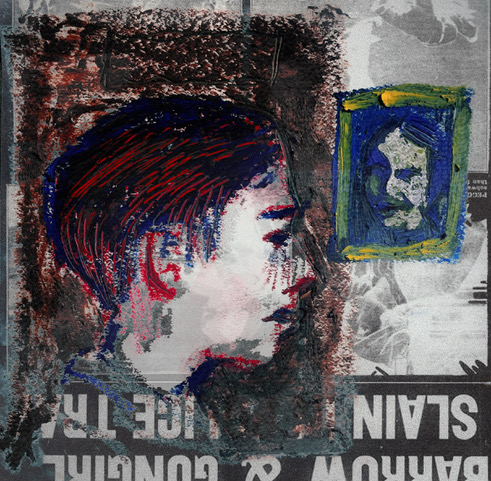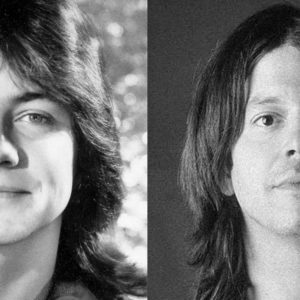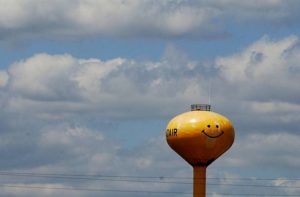Bonnie Parker was nineteen years old and had been married four years when she met Clyde Barrow in the winter of 1930. Together Bonnie and Clyde killed at least thirteen people before they were ambushed in Bienville Parish, Louisiana, in the spring of 34, their Ford Deluxe V-8 perforated with 167 bullet holes.

Remember, out by Cement City, river banks behind grandma’s shack, canebreaks coming up the yard. Hand-to-hand. Three. One— Two— No shoes, one Texas sock, cartwheeled wrinkles from the day. Tongue cross her teeth, cotton candy between. In car window she grins. Incisors pink-tinctured. Boys. Always. Looking her over, eyes thought they owned her, eyes saying, Hey there, back seat’s open, like she has no brains. B+s in English. Best subjunior speller 1922. She married the guy anyway. Guy the five-and-dime that time. Narrow shoulders. Tooth missing—grin useless as a broken watch. Pocketed a bottle of hair cream, witnessed with her own two eyes, whistled like he found a hundred bucks back of a rented car. Liked to take her places, he did, slipped a charm bracelet on her wrist, zirconium heart and little dog and dice. Sixteen’s young for a wife, she knows, lots she knows.
Going to CCHS a married woman, living with him, his bed, sour jailhouse reek, whiskery status, afternoon striated spiteful red. Back of Jack’s Famous Billiards, the neon sign, his name pinched blue ink upon her thigh. Easy. Three letters: R-O-Y. Wild, she can be. Flashes it for school friends, shows off the ring.
Moonshine cast spells against his nature, grabbed her arm sometimes, like to snap in two. Designs of moons and planets flung amid the stars, she sprawls ground-bound, spinning comets into comets, gathering cosmoses to her skirts. A book she studies after school, states the different colors she imagines they might be. People of the different states working different jobs they do. Hammering. Offices. Farmers. Cops. Men in suits, shined shoes. She went to Oklahoma once, Mother took them on a splurge, Greyhound’s window cracked to flush the burdened air, breeze suggestion on her cheeks, strands of gold before her eyes. Air’s bluer places, you know—Oklahoma so blue that time she’d taken to spell of praying. The furious press of now—past as futures not yet taken.
To conceive of life is to feel some dying in touch of soles upon the crumbling tar. Remember taking orders at All-Day Ray’s, steak and eggs, toast and marmalade, BLT, she’d sell eggs to chickens, ice cubes to Eskimos, eyeful of her nylon bra, store-bought, whispers feathers off a peacock, Bill-Tom used to say. Bonnie, nametag on her blouse used to say. Sometimes Beth. Melissa. Harry. For a laugh. Foolin’ with people. Way she is. Used to be. They drive in fury, seeking and redemption, you’d think vacationers on a lark sometimes, could be. Way he drives in socks, she sets one foot out the window. Fitz Special in trousers waist. Browning Automatics in the trunk, 3000 rounds, magazines, cartridges, arsenal for a brigade. She styles her hair herself in motel sink, arm so twisted it’s like to break. Bobs it. Straights it. Perm. Claudette Colbert’s. Myrna Loy, she thinks. Rubs her face with Oriental Creme, toes beneath sheets curl like sleeping bishops. Going places, used to tell herself, Amelia Earhart, poet, Queen of East Texas clear to Permian Basin, rigs, shrimp boats, Little Mexico. Backyard of the old shack the Parkers live/ East Texas n’er forgive—she recites to herself, reminding. Some lives worn out from the living. Twenty-two, she is. An actress. Pretty enough, Roy used to tell her, eyes of Dallas men feasted on her like starveling urchins’, whistles in the trading district. Alone, she dresses slip and stockings, kisses the mirror, taste of glass, cool, like lips. Used to go to silents at the Kenner Palace, organ vibrations undulations of the sea. Then movies start talking, words she did too. Very sorry, Miss Gilfird isn’t in this evening, she wrote. Driving, for a moment she misses being polite without a reason.
Met this boy one day. By the Trinity. Funny voice, shooting pigeons, giggles at broken wings, plumed confetti in the river. Plays guitar. Starting a band, he says. Standards. Al Jolson. Rudy Vallee. His face’s like a little mutt. Adman’s tie’s a tongue. Scent of Burma-Shave. Took some cars one time, he says, took a ladder through window of a toy store. Do it again, get her a stuffed bear this time, he says. Walks barefoot on the riverbank, have to be rich to stroll so carelessly. Doesn’t look at her like others, like he can’t think of nothing but undressing her, listens untalking to her Hollywood talk, momentum taking her in its arms. Sunny Side of the Street, his voice sweetly. Louis Armstrong. Ted Weems. Hums along, voices braided. Tin cans, newspapers, child’s ball, stuff going downstream, under water, popping up. Bets her when stuff’s coming up again, shows a solid wad, twenties, ones beneath. Not counterfeit, he says. He ought to know, looks like. So what. She lets him, kiss, touching side of her face she gets used to before he’s done. Two fingers, then her lips. Sincerest she’s ever been—kissed—more than Roy or playground boys. Kisses her in earnest, newspapers fly as risen eagles, winged over cottonwood stands, campgrounds where the farmers tending hobo fires.
Sometimes silence settles. Takes its kindred place with stars’ reticence. Staring down highways, straight-as-light highways, misfit highways bent as crooked ladies. Does your husband / Misbehave / Grunt and grumble / Rant and rave / Shoot the brute some / Burma-Shave… Poetry everywhere. Poets of underground, Milton as roadside advertising bard. Bonnie Parker/ Born to light/Took left turn /Not the right. Oklahoma, Nebraska, Iowa, Louisiana, square-shouldered states in quandaries of conscience. One day she says to him, What’s living ever done for anyone? Mother used to take them to the revivals. Sitting on bench, under the scorching tent, preacher flapping and chairbound rising in ecstasy. Talk like that don’t suit Clyde. Tunes out, drives bent over, like trying to outpace the car. Never seen him shave, his body in motel bed smooth as a girl’s, way she touches him. It makes him cross, his mouth slicing across bottom of his face like Y in Roy.
Clyde farts when cops fall back, as if at them. Wastes a bullet on an armadillo. For fun, veers off, flattening a path through the cornstalks. How he is. Singing. Not as wild as he used to be, he says, like a petition, like they might, little farmhouse, poultry yard, dream of rocking chairs. Ha. He reads True Detective Mysteries, studying lingo, detective technique, in motel rooms. His schoolbooks. Guns on the floor in blameless beauty, oiled wood, intricate mechanism, the barrels. Pistol-grip shotgun. Hammerless Colt 32. There’s killing, but— Not real. Someone’s brother. A guy who. Are they killers, she says to him once. Doesn’t like to hear it either. Taking from some filling station. Banks. Can’t blame them, no money living way they do. Everyone feeds off ends of civilizations, he says. Gypsies, citizens like anyone, bad times, you see people along the roads, camping out. The times. A bank teller went for the alarm that time. Old man pulled a pistol. Think about it, What’d living ever do for them? Their bodies crumbled, twitched, frothed, more matter-of-fact than you think. Easy to die.
Radio plays that song Clyde likes, the Ford V8’s tenor in accompaniment. Its moment’s claim upon what can’t be sustained. Roads come up, sun breaks over corn like it wants to break your heart. World looks upside down, stars suspended, cartwheeling way she did.










